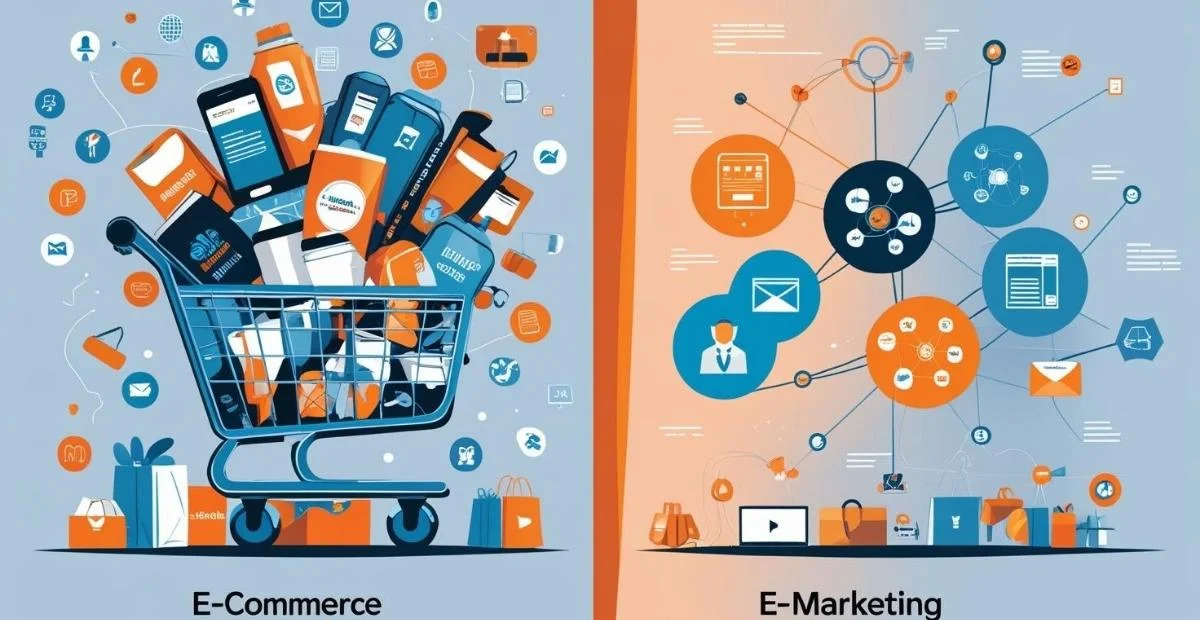As digital business continues to dominate the global market, entrepreneurs and companies are often confronted with the question: What’s the difference between E-Commerce vs E-Marketing? While both are essential components of online business success, they serve distinct purposes. One manages the buying and selling process, while the other ensures your target audience knows about your products or services.
Despite their differences, the true power of these two lies in how they complement one another. Let's dive deep into what sets them apart—and why mastering both is key to sustained online growth.
Understanding E-Commerce
E-Commerce is the process of conducting transactions over the internet. It covers the entire customer buying experience—from product listings to payment processing, order confirmation, and fulfillment. Any time someone buys a product or service online, they’re participating in e-commerce.
Key features of e-commerce include:
- Digital storefronts (e.g., Shopify, Amazon, BigCommerce)
- Online payment gateways (e.g., Razorpay, PayPal, Stripe)
- Inventory and order management systems
- Customer account portals
- Delivery and logistics integration
E-commerce focuses on turning browsers into buyers by streamlining the customer experience.
What Is E-Marketing?
E-Marketing, short for electronic marketing, involves promoting products or services via digital channels. It is the strategic approach used to drive awareness, traffic, engagement, and ultimately, conversions.
Popular e-marketing tactics include:
- SEO (search engine optimization)
- Social media marketing
- Pay-per-click (PPC) advertising
- Email campaigns
- Content marketing
- Influencer partnerships
E-marketing is not just about getting attention—it’s about attracting the right audience and guiding them toward purchase intent.
E-Commerce vs E-Marketing: The Core Differences
Here’s a breakdown of how E-Commerce vs E-Marketing differ:
CriteriaE-CommerceE-MarketingMain GoalSell products or services onlinePromote products and attract potential buyersInteraction PointDuring and after purchaseBefore and during purchaseFocus AreaProduct delivery, transaction, logisticsBranding, traffic, customer engagementToolsShopify, Magento, WooCommerceGoogle Ads, Mailchimp, Facebook AdsOutcomeRevenue, customer satisfactionVisibility, leads, conversions
Simply put, e-commerce is where the transaction happens, while e-marketing is what brings the customer to that transaction.
How They Work Hand-in-Hand
Instead of treating E-Commerce vs E-Marketing as separate paths, savvy businesses treat them as a dual strategy.
Here’s how they support each other:
- E-marketing generates traffic, increasing visibility and interest.
- E-commerce converts traffic into sales with an optimized platform.
- Marketing analytics provide insights into customer behavior and help refine the shopping experience.
- Retargeting ads and email follow-ups bring back lost sales, directly affecting your e-commerce metrics.
Without marketing, no one finds your store. Without e-commerce infrastructure, your marketing has nowhere to lead people to.
Real-World Example
Imagine a startup selling eco-friendly water bottles:
- The company runs Facebook ads (e-marketing) to drive interest and traffic.
- Users click through to a website built on Shopify (e-commerce).
- The website is optimized for mobile checkout and offers easy payment options.
- Email automation (e-marketing) follows up with abandoned cart reminders.
- The order is fulfilled via the company’s inventory system (e-commerce).
Each step of the customer journey relies on the integration of E-Commerce vs E-Marketing.
Benefits of E-Commerce
- Operates 24/7 globally
- Reduces overhead costs
- Offers data for targeted strategies
- Allows businesses to scale quickly
- Streamlines product delivery
Benefits of E-Marketing
- Reaches highly targeted audiences
- Builds brand awareness and loyalty
- Delivers measurable campaign performance
- Increases website traffic and conversion rates
- Engages potential buyers across multiple channels
Conclusion
When evaluating E-Commerce vs E-Marketing, it's not about which one is better—it’s about how well they’re integrated. E-commerce provides the platform to sell, while e-marketing delivers the strategy to attract and retain customers.
Businesses that master both can build lasting relationships, improve ROI, and grow sustainably in today’s competitive online ecosystem. In the end, the question isn’t “E-Commerce vs E-Marketing,” but rather “How well are you using both to your advantage?”






Comments